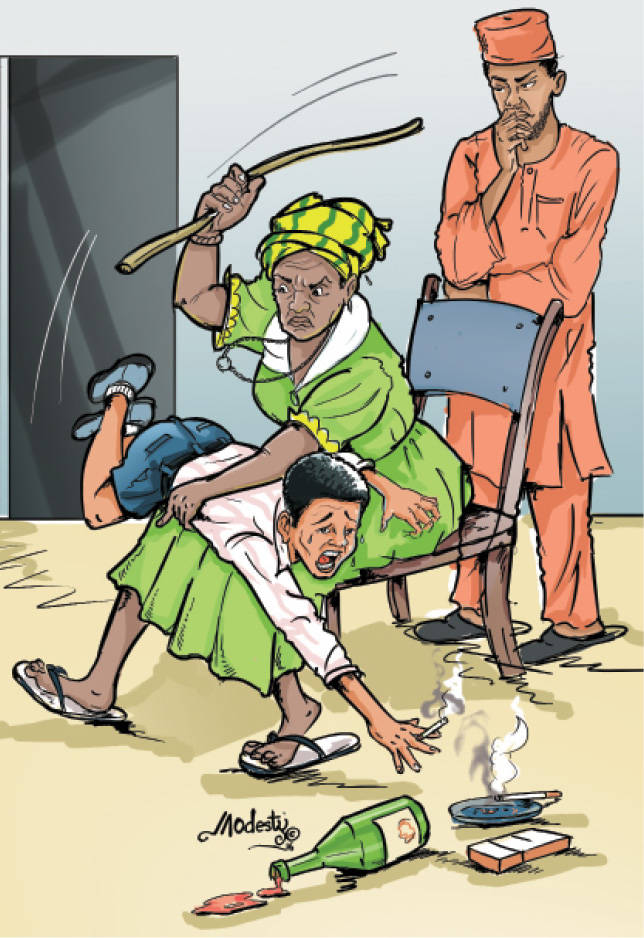
Following the launch to end violence against women by then UN Secretary General, Ban Ki-moon in 2008, communities across nations are yearly called upon to intensify the campaign to create a world free of violence against women and girls.
For 16 days, from November 25 to December 10, different issues affecting women, girls and their rights are highlighted in various fora and the call to bring change is louder during the period.
The perpetrators of violence – physical, sexual and emotional – against women are in most cases seen and deemed to be men.
However, there have been cases of violence against another group: children, in recent times. Sadly, the culprits, apart from where the abuse is sexual are in most cases, women.
While the call is for violence against women to end, this ugly trend against children is rearing its head in different parts of the country.
Recently, in one of the southern states of Nigeria, a couple was reported to have formed the habit of daily neglecting a toddler in an empty room without furniture or bedding all day while the biological father and step mother with their other children pursued each day’s business.
The two-year-old boy was left with neither food nor water or at best with days-old garri/eba without soup.
Another story that led to the public outcry, especially on social media shortly before the toddler incident, was that of a woman in Lagos State who locked up her domestic servant, a teenage girl, while she travelled abroad. The girl was said to have been left without provision for adequate feeding or care.
Still more alarming was the case of a woman who allegedly pushed her house girl from a storey building for suspected theft.
All three cases are said to be under investigation by the Nigeria Police Force.
The right of the child against violence and abuse receives strong protection in various laws, the UN Convention on the Rights of the Child and the Sustainable Development Goals are some examples. Many countries including Nigeria have domesticated these laws.
But they seem insufficient.
Research reveals that every five minutes a child dies from violence, as stated by the Global Partnership to End Violence Against Children .{WHO 2016].
One billion children – over half of all children aged 2 to 17 – are estimated to have experienced emotional, physical and/or sexual violence. [WHO 2016]
This is excluding alarming figures recorded in other forms of violence against children in areas of conflict.
A legal practitioner in Nasarawa State, Barr. Moses Obeta, who doubles as a human rights lawyer, explains that laws abound in Nigeria to prevent violence against children. He says, “Child abuse is any treatment that is contrary to the dignity of the child as enshrined in Chapter 4 of the Nigerian Constitution.
There are also laws like the Child Right Act, a law that protects the right of every child. Section 11 of the said Child Right Act provides certain dignity for that child so that any treatment that goes against such rights shall be deemed child abuse.
He explained that the law does not discriminate because he or she is from a particular tribe or religion or whatsoever but because he is a human being.
Mrs. Tinuke is a mother who resides in Abuja with her family. Although she believes in proper upbringing of children, she says she draws the line when it comes to violence against children.
She said, “I am totally against child abuse. I have five children – three boys and two girls – yet I still take care of my husband’s sister’s two children. I treat them like my own daughters, because it is good to do to others what you want others do to you.”
She opined that it’s not about religion or culture, but all about love.
While the outcry usually is against the culprits and how to punish them for their acts, there is always the danger of society forgetting to measure the negative and longtime impact of abuse on the victims.
Medical experts and studies are, however quick to point out that when a child experiences abuse, he/she is likely to be damaged for life (where instant or subsequent death is not recorded) or may go about with the physical/emotional bruises for a long time.
These findings make it clear that violence against children breeds damaged citizens, consequently robbing the nation of some of those who might have become its best and brightest had they not been damaged at some point in their young lives.
Experts are also concerned about the possibility of the abused child becoming an abusive adult in future, making the cycle of abuse one that keeps rolling over.
Apparently, it is not only members of the public who are concerned about the dangers of child abuse.
Recently, during an event to celebrate the National Children’s Day in Lafia, Nasarawa State, the Vice President, Yemi Osinbajo’s speech was read by the Nasarawa State Commissioner of Youths and Sport Development, Mr Bamaiyi Anangba, who vowed to ensure that the rights of the Nigerian child are protected.
He urged other stakeholders to join in the fight against child violence, as well as make sure that Nigerian children enjoy whatever is their due.
The Federal Government also called on state governments to adopt laws and policies that would bring an end to violence against children and other cultural practices that hinder their development.
However, for society to be healthy and productive, the lives and fate of its young must be protected, hence the need for an end to child abuse in all the ways it presents itself, especially where the perpetrator is a woman who has herself in recent times been enjoying calls for protection.
For Barr Obeta, he adds that government has done a lot in the fight against child abuse, which he says is enshrined in the Nigerian Constitution.
“Not that I am against the Child Act Law, but I see no reason for it because we have the African Charter on Human Right, the Nigerian Constitution, penal code in the north, criminal code in the south, and criminal code.
All these laws are there to protect the child. What the government needs to do is to step up its effort in the area of enforcement and implementation.
“Families should be encouraged to love and protect their children, whether biological, adopted or in their employment.
The laws of the land should also be strengthened to sanction perpetrators severely and make it easy for neighbours or witnesses to report incidents of abuse.
There must in addition be a care, support and rehabilitation system in place for children who are victims of abuse,” he said.
Before another celebration, everyone must remember that children are human beings with rights.

 Join Daily Trust WhatsApp Community For Quick Access To News and Happenings Around You.
Join Daily Trust WhatsApp Community For Quick Access To News and Happenings Around You.


